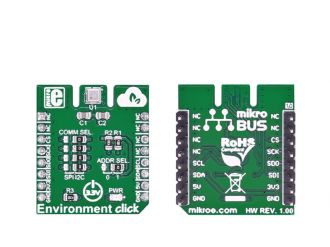
We strongly encourage users to use Package manager for sharing their code on Libstock website, because it boosts your efficiency and leaves the end user with no room for error. [more info]

Rating:
Author: MIKROE
Last Updated: 2019-05-29
Package Version: 1.0.0.1
mikroSDK Library: 1.0.0.0
Category: Environmental
Downloaded: 5696 times
Not followed.
License: MIT license
Environment click measures temperature, relative humidity, pressure and VOC (Volatile Organic Compounds gases). The click carries the BME680 environmental sensor from Bosch. Environment click is designed to run on a 3.3V power supply. It communicates with the target microcontroller over SPI or I2C interface.
Do you want to subscribe in order to receive notifications regarding "Environment click" changes.
Do you want to unsubscribe in order to stop receiving notifications regarding "Environment click" changes.
Do you want to report abuse regarding "Environment click".

Library Description
The library covers all the necessary functions to control Environment Click board. Library performs the communication with the device via I2C or SPI driver by writing to registers and by reading from registers. The library has generic write and reads function, get ambient data function, get temperature, humidity, pressure and gas resistance data from the register, function for reading factory calibration, for sets default configuration, etc.
Key functions:
float environment_getAmbientData( uint8_t dataIn ) - Get ambient data function.void environment_defaultConfig() - Set default configuration function.void environment_getCalibrationData() - Get calibration parameters function.Examples description
The application is composed of the three sections :
void applicationTask()
{
temperature = environment_getTemperature();
Delay_10ms();
mikrobus_logWrite( " Temperature : ", _LOG_TEXT );
FloatToStr( temperature, logText );
mikrobus_logWrite( logText, _LOG_TEXT );
mikrobus_logWrite( degCel, _LOG_LINE );
humidity = environment_getHumidity();
Delay_10ms();
mikrobus_logWrite( " Humidity : ", _LOG_TEXT );
FloatToStr( humidity, logText );
mikrobus_logWrite( logText, _LOG_TEXT );
mikrobus_logWrite( " %", _LOG_LINE );
pressure = environment_getPressure();
Delay_10ms();
mikrobus_logWrite( " Pressure : ", _LOG_TEXT );
FloatToStr( pressure, logText );
mikrobus_logWrite( logText, _LOG_TEXT );
mikrobus_logWrite( " mbar", _LOG_LINE );
gas = environment_getGasResistance();
Delay_10ms();
mikrobus_logWrite( " Gas Resistance : ", _LOG_TEXT );
LongWordToStr( gas, logText );
ltrim( logText );
mikrobus_logWrite( logText, _LOG_LINE );
mikrobus_logWrite( "--------------------------------", _LOG_LINE );
Delay_1sec();
Delay_1sec();
}
Other mikroE Libraries used in the example:
SPI or I2CUARTConversionsAdditional notes and informations
Depending on the development board you are using, you may need USB UART click, USB UART 2 click or RS232 click to connect to your PC, for development systems with no UART to USB interface available on the board. The terminal available in all MikroElektronika compilers, or any other terminal application of your choice, can be used to read the message.